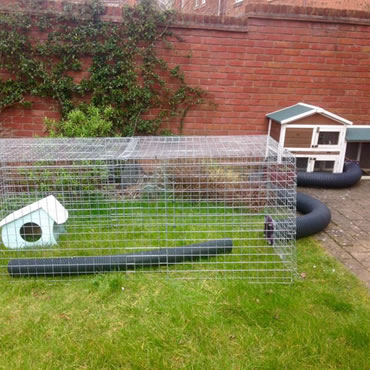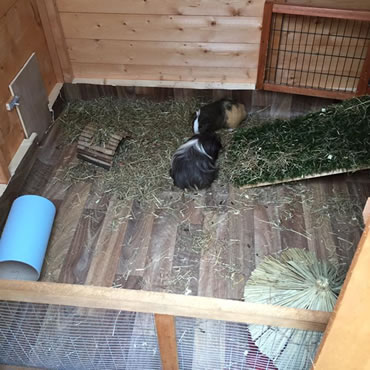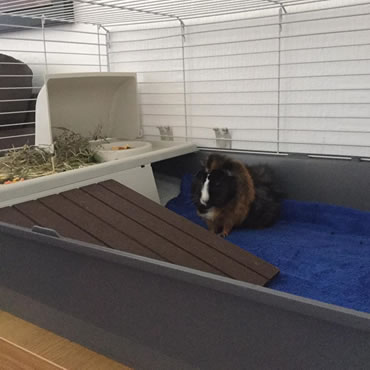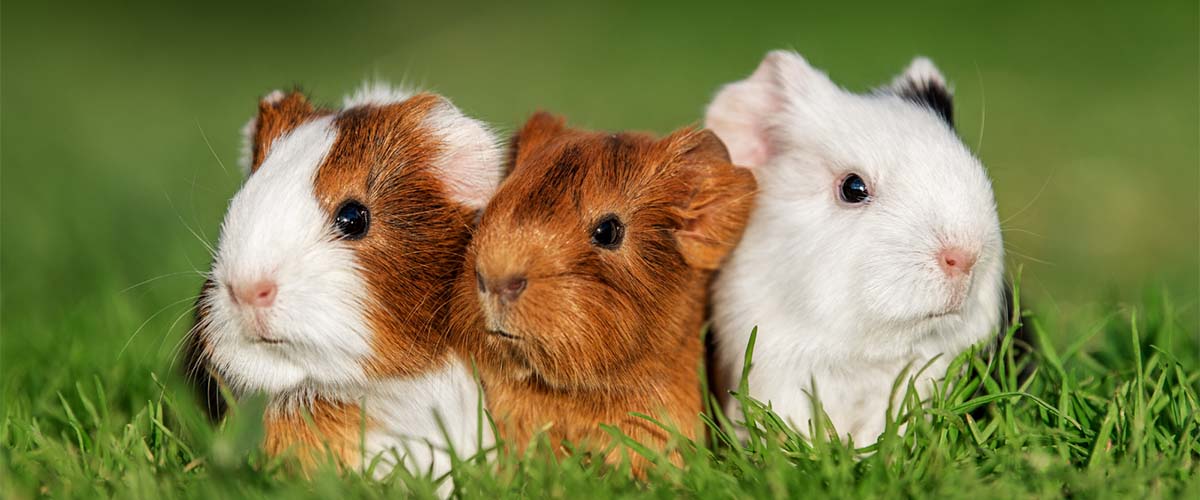The ideal home for your guinea pigs
Guinea pigs are very active animals and they need lots of space as well as plenty of toys, hides and tunnels to keep them healthy and happy. If your guinea pigs don’t have the right home it can lead to boredom and health problems.
There are lots of different ways you can make the perfect set up for your guinea pigs. A large hutch and a big exercise area provide them with the ideal living area, a cosy bedroom to snuggle up in and plenty of room to run around and explore.
Guinea pigs can live indoors or outdoors, so long as they have enough space and you can keep them at a comfortable temperature in the summer heat or bad winter weather. You can also keep your guinea pigs in their own heated outhouse, a car-free garage or a shed.
If your guinea pigs have access to the outdoors, it’s important to be careful in bad weather. Their bodies are very low to the ground and they can get cold and dirty on their bellies. Make sure their exercise area doesn’t get too wet or muddy and avoid any hard or cold surface that might hurt or damage their feet.
- A large hutch - the bigger the better but at least 1.5 x 1m (with a 2m x 1m run attached). Make sure it’s weatherproof and raised off the ground.
- A safe and comfy lining in their hutch. Clean wood shavings or sawdust are suitable. Any lining used should be dust-free.
- Clean, dry hay, straw or shredded paper as bedding. Your guinea pig will also need feeding hay to eat. You can read more about this on our guinea pig diet page.
- Constant access to a large exercise area. Guinea pigs don’t usually have one long sleep at night but they still need to take naps throughout the day and night. They’ll need to be able to choose when to go to bed and when to be active. Their exercise or run area should be least 2m x 1m but again the bigger the better. Ideally, this should be a grassy area without too much mud and no standing water. You may need to move their run or exercise area frequently, especially if it get dirty or they’ve eaten lots of the grass. Try to avoid concrete or very hard surfaces as these can give your guinea pigs sores on their feet. If you keep your guinea pigs inside, make sure you keep them on a non-slip, not carpeted, easy to clean surface.
- Lots of tunnels, shelters and hides in their run so they can move around confidently, explore and hide if they want to.
- Plenty of toys and activities to keep them entertained.
Enclosure ideas for your Guinea Pig
Here are some great guinea pig enclosures to inspire you:



What to do in summer and winter
Summer heat or stormy winter days can be a danger to your guinea pigs. You’ll need to make sure they’ve got suitable shelter:
- Guinea pigs are sensitive to hot weather and can get stressed if the temperature goes too high- anything above 24°C can be uncomfortable for your guinea pig but a temperature above 27°C could lead to . In hot weather, move their hutch into a shady area and make sure your pigs have some shaded areas in their run. Find out more about caring for your guinea pigs in summer.
- You can protect your guinea pigs from cold winter weather by bringing them indoors or keeping them in a warm shed or car-free garage. Give them extra bedding when the weather gets really cold. Remember they’ll need a large indoor exercise area too. Read more about caring for your guinea pig in winter.
Keeping your guinea pigs clean
Regularly clean out your guinea pigs to make sure their home is healthy and hygienic. They’ll need daily, weekly and monthly cleans.
Daily
- Get rid of any wet or dirty wood shavings and bedding.
- Throw away any uneaten fresh food and nuggets so it doesn’t go stale or mouldy.
- Wash the food and water containers before refilling them.
- Move their exercise area each day, especially if it gets dirty, muddy or lots of the grass has been eaten.
Clean the hutch more thoroughly once a week to keep it hygienic
Monthly
- Take your guinea pigs out of their hutch and put them somewhere safe and secure (for example in their exercise area with a box to hide in).
- Empty the hutch completely, clearing out all bedding and lining material.
- Scrub it thoroughly, inside and out, with a pet-safe cleaner. You can buy safe cleaning products in pet shops or on our online pet store.
- Only let your guinea pigs back in when the hutch is completely dry.
- Don’t forget to clean their toys and shelters too.
Is your home and garden safe for guinea pigs?
There can be hazards around our home that spell trouble for curious pets. Give your home and garden a quick guinea pig safety check and look out for:
- Potential predators. Check your guinea pigs’ hutch and exercise run are escape-proof for your inquisitive friends and secure from prowling predators like foxes and cats.
- Electric cables. Keep your guinea pigs well away from any electric cables – they might chew through them and get a shock.
- Poisonous plants. Some common garden plants – like poppies, tulips and daffodils – are toxic to guinea pigs and other pets. You can read more about poisonous plants on our poisons and hazards page. If in doubt, keep your guinea pigs away from flower beds so they can’t nibble anything that might harm them.
- Herbicides and pesticides. These garden chemicals are poisonous to pets. Keep your guinea pigs well away from any areas that have been treated with them.
The right enclosure
Find out more about the best enclosure for your guinea pigs and other small pets.
Read moreSuitable substrate
Get expert advice on what substrate - lining material - is best for your guinea pigs' home.
Our adviceIntroducing Guinea Pigs
Guinea pigs are very sociable creatures and prefer living in pairs or small groups, like they would in the wild.
Making friends
